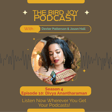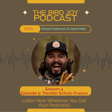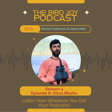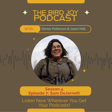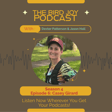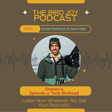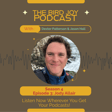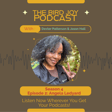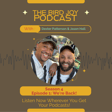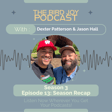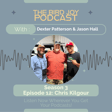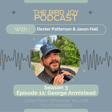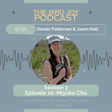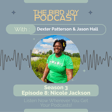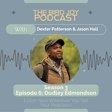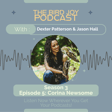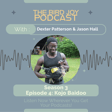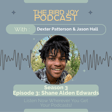Become a Creator today!Start creating today - Share your story with the world!
Start for free
00:00:00
00:00:01

On-Site with the Soaring Eagles: STEMM, Marshes & Bird Joy in Toledo
In this special on-the-road episode, Dexter and Jason visit the Soaring Eagles of Chase STEMM Academy in Toledo, Ohio, for an inspiring conversation with 6th and 7th-grade student ambassadors. Just steps from Manhattan Marsh, these young scholars are exploring nature, STEMM (Science, Technology, Engineering, Math, and Medicine), and their big dreams. Shout-out to Vonda Hogle for helping bring this recording to life! Another big shoutout to the folks at The Biggest Week in Birding for connecting us with this incredible school.
Episode Highlights
- Welcome – Dexter & Jason share their journeys in science, birding, and the power of outdoor learning.
- Birding at the Marsh – Students reflect on nature sightings and the magic of having a marsh next to their school.
- STEMM Spotlights – Student ambassadors talk favorite subjects, proud projects, and future careers in STEMM fields.
- Flip the Mic – Students ask the hosts about birding, STEMM careers, and staying curious.
- Final Takeaways – A call to keep exploring—in the classroom, in nature, and beyond.
Key Themes
- Nature as a living classroom
- Birding as a gateway to science
- Empowering the next generation of STEMM leaders
- Joy, curiosity, and connection in education
🎧 Listen wherever you get your podcasts. And don’t forget: keep asking questions, keep exploring, and keep spreading that Bird Joy. Let’s go!
Transcript
Introduction to Bird Joy Podcast
00:00:00
Speaker
You're tuned in to season three of the Bird Joy podcast, hosted by Dexter Patterson and Jason Hall. This podcast is for all the homies across the globe, a place to celebrate birds, community, and joy together.
00:00:15
Speaker
We're back with more stories from the birding world, more voices doing dope work in STEM, and more reasons to get outside and enjoy the birds. Are you ready for some bird joy? Let's go.
Hosts' Backgrounds and Birding Clubs
00:00:28
Speaker
Hello, everybody. We are super excited to be at the Chase STEM Academy. My name is Dexter Patterson. I'm also known as the Wisco birder. I am a science communicator and educator at the University of Wisconsin-Madison.
00:00:41
Speaker
and a bird photographer. I also lead my own birding club called the BIPOC Birding Club of Wisconsin, where my mission is to get more black and brown people outside in the outdoors.
00:00:52
Speaker
And that on-ramp is birds and helping people connect with nature, having fun, and trying to create some connections in some meaningful ways. Yeah. And I'm Jason Hall. I am also a scientist, although i work in a totally different space. I work in molecular biology. I'm a vaccine development scientist and have been for almost 20 years now. Outside of working in the lab, um I founded In Color Birding Club in Philly, where I really focus on getting black and brown communities out into birding. right? And finding that joy.
00:01:23
Speaker
um And both career aspects for me require some science communication, especially with vaccines over the last ah five years or so and everything that happened with the pandemic. So um yeah, I'm really happy to be here with y'all and I hope you all enjoy this conversation.
00:01:38
Speaker
Yeah, we're if you don't know, we're big fans of STEM.
Importance of STEM Education
00:01:41
Speaker
Just to see all of these students, the students we met earlier at the Marsh and you all, to see students who are doing big things in science, technology, engineering, math, and medicine is super, super exciting to us. So hats off to y'all. What you are doing matters. And the things that you are learning are going to open up doors for you.
00:02:01
Speaker
You know, science earners and people who know the most math, they also are the highest earners. um So go get your pockets right. All right. You're going to get your pockets right by taking these courses and and really thinking about these STEM fields as as you continue to grow. Yeah, and you guys have an amazing access point right here to nature, right? we Dexter and I were out there this morning and it's got to be really special for you all to be able to just go straight outside. And I saw the meadow out there and be able to study some of the things out there um and even find yourself, you know, being able to find some peace and quiet,
Nature's Stress-Reducing Benefits
00:02:32
Speaker
right? We were talking about how stuffy it is sometimes in different places. And sometimes as a kid, I know you don't want to be in school, but you got that right out there, which most schools in this country don't have. So that's got to be really special.
00:02:43
Speaker
I would say too, especially you all are going through testing, being a kid is hard, being a student is hard. So I would say too, if you're starting to feel overwhelmed or you're stressed out, going outside and just being in nature is really helpful.
00:02:58
Speaker
You don't gotta like birds, you don't gotta like animals, but you can listen to them. You can get some sun on your face, let the wind hit you, hearing some running water. It really does bring down your stress levels and it is for you. And that's one thing I always stress to kids is never forget that nature is for you. You're in a technology school. I get it. Technology is so amazing. I have three kids at home. They love their technology, but it's also good to so unplug sometimes and decompress a little bit and allow your mind to slow down a little bit. So I encourage you, continue to to go outside in nature and understand that it is for you. Yeah, and there's a lot we can learn, obviously, from exploring the nature around us, right? And you all have that marsh out there.
00:03:41
Speaker
And um I think we want to really dive in to learn about what you guys are seeing, doing, learning in that space and what things you dream of doing in that space here at Chase STEM. So how many of you, obviously you've been to the marsh, right? So you all go out to the marsh. What are some things that you've seen or noticed there?
00:03:59
Speaker
And I'd love to just have you all head over to the mic and let us know. What what are some cool things you've seen or noticed at the marsh? Yeah.
Student Observations and Conservation Awareness
00:04:10
Speaker
When we go inside the marsh, we see like the birds that we study about, which is green herons, red-winged blackbirds, turtles, we see turtles, you see frogs, well, deers, of course, rabbits, and fish, and indigo bunting. The cool thing about the indigo bunting, fun fact about them is they're actually not blue.
00:04:36
Speaker
There's a science behind that that makes these blue birds, even blue jays, blue jays are actually brown. Their feathers are not. They look blue to us, to the UV light and how it interacts with the feathers on. i know. I know. Right.
00:04:49
Speaker
was like that emoji where your head blows up when I start learning some of this stuff like blue birds. Fascinating. Science. You know, do you know how that happens? So there's a structure in their feathers that does not absorb blue light.
00:05:04
Speaker
So, you know, you have your color spectrum, Roy G Biv. I don't know if you guys learned about that yet. And so the blue light, when it comes down in the full color spectrum from the light in our sky, it just doesn't absorb it. So it bounces back and goes straight into your eyeballs.
00:05:18
Speaker
Right. So if you pulled that blue J feather out and looked at it closely, it would look gray. right And so it's pretty interesting how those animals adapt themselves to show that color blue, especially since birds can also see UV color. What we're seeing is totally different from what they're seeing. So i just heard yesterday that male and female American robins, they both you know kind of have a ah dark brownish chest. The female's a little lighter, but the male's chest actually has some different UV colors that the female can notice. So they very easily know which one is male and which one is female based on that. But we can't see that.
00:05:51
Speaker
Quite, quite interesting. Vontes, thank you for sharing that. why you Can somebody tell us why it's important to have a space like the Manhattan Marsh?
00:06:02
Speaker
Why do you think it's important to have those protected areas? like Is that something that you've all been talking about? Preserving habitats and protecting some of these spaces? Why would that be important?
00:06:13
Speaker
Yeah, I like it. It would be important because to get outside and go see other adventurous stuff, and it's also good for the animals because they have a space to live, and they don't like when humans destruct their habitats and more stuff like that. You nailed it.
00:06:35
Speaker
It's funny how us humans do a lot of destructing. We do a lot of destructing. I think you summed it up really well. is We need those places like the marsh because the animals, we're not promised to have the birds that Vontaze talked about. We're not promised to have them forever. We're not promised to have the frogs and you know the different species that you all talked about here today because of habitat.
00:06:59
Speaker
destruction and things like that. So protecting this conservation is really, really important. And having young scientists and people that are exploring is really important because you all are the future.
00:07:11
Speaker
This is your world, right? This is your world that hopefully we don't destruct. You know, the older folks don't mess up too much for y'all because we want you all to be able to enjoy those spaces for a very, very long time.
00:07:25
Speaker
Yeah. And is there any, you know, as you look at that space out there, right, you guys have been out there a lot. Is there anything you're curious about in that space? Anything you wonder if it lives out there or could live out there?
00:07:37
Speaker
Anything you hoped you would see out there one day? One thing I actually wondered before I even went out there when I found out there was marsh back there was if like sharks. Oh,
00:07:49
Speaker
But then when I went out there and I found out I sounded kind of like crazy because there's no sharks out there. But there is these like big birds that live out there with their babies though.
00:08:00
Speaker
And one time when was going out there to go test for a globe thing, there was this bird with the babies on it, with the babies on like this like little paddle thing, and they started ah they started yelling at us.
00:08:12
Speaker
Not me, yeah but they was yelling at us. And our teacher, Ms. Palana, our science teacher, she had told us the reason they yelling because we was coming a little too close to their babies. Yeah, this is the time of year, right?
00:08:25
Speaker
Same way you would get if somebody stepped on your front porch that you didn't know. He'd be like, who is this at my front door like they know me, right? They're very protective of their babies. Especially the Canada geese.
00:08:36
Speaker
Is that the ones you were seeing out there? They're going. Yeah. Yeah. They'll stick their tongue out at you. That's when you know you way too close. We call them ninja chickens.
00:08:48
Speaker
What you got, Fontes? Two things I want to see when I'm going to marsh is a bald eagle, like up close. Up close? Yeah, up close and a snapper turtle.
00:08:58
Speaker
Ooh, those are two amazing animals. How big was the snapper that you saw? Because they can get huge. Yeah. um Okay, so it was at least 15 inches. Wow.
00:09:11
Speaker
I think, no, actually I don't think, no, I do think it was hurt because then I told my sister to run home and get a towel because it was just sitting up there just right in front for humans to see.
00:09:23
Speaker
So my sister went home and got a towel and she put a stick in its mouth. So I went tried bite her and she picked it up and went to go put it by the water help Ah, love it. Yeah. yeah Does anyone know any fun facts about snapping turtles? What they do in the wintertime to survive?
00:09:40
Speaker
No? So if y'all get a chance, if you see one out there in the winter, go check if that ever freezes over in the wintertime. Go just look under the ice a little bit. Like look down from the boardwalk. Because snapping turtles will go into something called brumation, where they literally slow down their entire body's metabolism.
00:09:55
Speaker
And they just let themselves freeze. And they'll stay underwater. And they breathe through exchanging oxygen in their body. in their bum. So they have a ah pathway to do that and they'll just stay there.
00:10:05
Speaker
I was out with some kids over the winter and we were walking down a boardwalk and there was this snapping turtle that was frozen. It looked like the scene from Godzilla when he's frozen in the ice, like he's about to fight something and it was just super wild. So definitely check that out in the wintertime as you guys are out
Students' STEM Interests and Career Aspirations
00:10:20
Speaker
there.
00:10:20
Speaker
Yeah, all turtles do that. Frogs as well. They go as low as they can and they just chill, literally. Not bad. Yeah, it's beautiful. So we're at a we're at a STEM school and when they asked us when we came here, we came here for the biggest weekend birding festival, obviously because Jason and I are birders. He did a presentation already. I'll be giving a keynote speech tomorrow.
00:10:42
Speaker
When they asked us, y'all want to go meet with some kids? We were like, yes, and especially kids at a STEM school. I'd love to hear about what your favorite class or subject is here and why.
00:10:54
Speaker
What's your favorite class or subject? Mine's math. I like math very much. don't know why. just do. And my mind, like, it comprehends it. That's good. and yeah if you if you get math...
00:11:06
Speaker
that's ah That's a blessing, right? It's not always easy. It wasn't for me. It wasn't for me. Yeah, what's your favorite class and why? I would love to hear from from a variety of you. This is really cool. I'm always interested in this.
00:11:18
Speaker
ah Especially really count, like, as a class or no? Yeah. Oh, well, math and gym. Math and gym. And probably STEM. So in your STEM, what do you what do you all, you kind of talk about everything in that class?
00:11:31
Speaker
No, not really, but it's like technology. Like we could like make it like our own websites. Like scratch, think that's what. Coding. Yeah, coding to make like own like our own games. That's really cool.
00:11:45
Speaker
It was trying to make a green heron like type of game and make it as our own website. It was going to show like facts and what to know about green herons and other birds in the marshes.
00:11:56
Speaker
Love it. Green herons are super cool birds too. They actually use tools and bait. Like they'll throw out a piece of ah bait that fish would like and they'll try to, they'll chum the water. They'll do all these little cool things and they'll just throw it out there and wait for a fish to come get in and snatch them. So they're super, super smart birds.
00:12:13
Speaker
What else? What's your favorite? What's your favorite? Come on. Let's get up to the mic. let Let's hear. My favorite class probably be math. Math. I love y'all doing it the right way. All these kids liking math. This is it's funny because. Yeah, because I don't find it hard. The easiest class you got right now?
00:12:28
Speaker
Okay. So you're just out here just doing math equations in your head just randomly. is All right. I like it. All right. Yeah. Y'all got scholars. I love this. Scholars. All right. Anyone else that is. Yeah, Brody. Math.
00:12:39
Speaker
Math too. All right. Anyone else not math? Favorite class is reading. Reading. Some people find it boring, but to me, I like reading. Leaders are readers. Yeah, I like reading. Math, I don't like math. I never liked the math.
00:12:52
Speaker
I like science. I don't like social studies. It's kind of boring. I'm sorry. yeah I'm sorry. I still love you. I still love you. But science and reading and English is my favorite class. Even though I'm kind of lacking in English, I still love it.
00:13:10
Speaker
The more you read, though, that's going to boost all the English, writing, everything. So that's a great habit to start building early. Leaders are truly readers. and We just did a podcast episode with Dr. J. Drew Lanham and he talks about the need for prophets and poets in science. Where it's not always needing to publish all of your data in some academic journal, but being able to express how you feel about the science or even express it in a way to other people with English, right? With ah different kinds of books and storytelling. So that's awesome. That's great.
00:13:42
Speaker
Brody, you got something to say? Okay.
00:13:47
Speaker
Have you guys worked on any, I know you worked on the podcast and I heard a little bit about the website. are there any projects that y'all have worked on this year that you're particularly proud of or enjoyed working on? Come on. Yeah, we like we want to hear from you.
00:13:59
Speaker
You seemed excited. So now I'm excited.
00:14:03
Speaker
Okay, let's go. so presented at the zoo. Awesome. a whole project at the um zoo. ah We did a globe at the zoo yesterday. Okay. My project was phosphates and turidity. Wow. Let's go.
00:14:16
Speaker
Let's go. Tell me. Tell me, please.
00:14:20
Speaker
How did it feel to to be able to go to the zoo and talk about that project, though? How did that make you feel? It was cool. Good. Thank you for sharing. Yeah, that's awesome. It's a great project. Who else? Come on, Brody. Let's go, man.
00:14:32
Speaker
I love it. Me and some of my classmates are making an animation. Animation? What are you making it about? um Kind of a horror animation. A horror and animation? So what's the scary story you're telling?
00:14:44
Speaker
so So people wake up in this random place that has no escape. oh And heres these months there is a monster with only one smart head, and it's three-headed.
00:14:58
Speaker
And there's no there's no escape at all, so they can't work together to figure out anything, huh? So they're just doomed. monster only has one. Only one out of three of the heads is smart. This sounds kind of funny, actually. I want to know what the monster is like.
00:15:11
Speaker
love That's awesome, Brody. Thank you. It's not like a project, but I think we was trying to like, we was drawing, and, like, and I think we was, like, putting it on a podcast.
00:15:24
Speaker
I don't even know who did it, but it was it was the girls that did all the drawing and Lots of technology stuff. I'm loving this. I'm loving this. What else? What are some other cool projects you worked on?
00:15:36
Speaker
Look like you work on some cool stuff. What what have you worked on? Did like not me.
00:15:43
Speaker
Anybody else? All right. Awesome. Should be proud of the work you do. Y'all spend all this time in here. and really a school project, this is one I did myself, but I have this like book and I have a page for each one of the birds we have in the school, like indigo bunting, red-brain, rockbird.
00:15:58
Speaker
It has a picture of it and then everything it eats and all that. That's fantastic. It's a bird journal. I left it home. yeah That's all right. That's amazing. That's awesome. Do you remember what it was, Vontes?
00:16:11
Speaker
another project the sixth graders and the seventh graders made um like a qr code to like if you scan it it will take you like to our podcast order episodes oh nice and one episode it's a trivia episode is like where if was listening in the episodes that we told it will um it's like a like sand and 10 but it's like something like that i don't know what it's called but okay it's something All right.
00:16:37
Speaker
Love it. the The younger kids we're talking about, they created these posters. Indigo bunting was on there. And then you're able to scan it and then go maybe hear the bird, learn some different things about the bird. So I'm loving hearing about how you all are using some of this this technology here.
00:16:55
Speaker
All right, so you're taking all these cool classes, you're doing all these projects. Are there any STEM careers that are speaking to you at a young age that you see could be for you?
00:17:06
Speaker
but What are some of the careers that you all have been looking into that interest you? no I don't know if it's STEM career, but want to be a physical therapist. Medicine. So you all have that medicine angle at this school here. So that is fantastic.
00:17:22
Speaker
We were talking about the need to have people to out at the bird walks to massage people's necks. This time of year, the warblers come through and warblers are the tiny songbirds.
00:17:33
Speaker
Warbler means singer. And they're always at the top of a tree canopy and everybody's like this all day. And then they go home and their neck hurts. um So we could use some physical therapy on the neck sometimes after a long day. of hear one those yellow warbler's out the window. Yeah, yellow warbler calling. It's been calling the whole time outside. Sweet, sweet, sweet. I'm so sweet.
00:17:53
Speaker
So I wanted to be like a hair, eyelash, and nail person, but I was also thinking about being a dermatologist. I don't know that's involved in STEM. You can both. I've seen people like that cosmetology, like a lot of those folks are kind of both. Like they specialize in skin and hair and all that. So I would say if you're passionate about it, pursue it because then you get fulfillment after a long day's work.
00:18:17
Speaker
If you actually like what you do, even if you work hard, you go home and you're like, you know what? At least I'm doing what I love. think you could be both. Absolutely. That's awesome. What else we got? What else we got?
00:18:29
Speaker
Somebody we haven't heard from. Go ahead. Go ahead Brody. Looking at y'all though. Yeah. I know which ones, I know which ones we haven't heard from. One, two, three, four. All right. Yeah. What kind of career you thinking about? What you thinking Brody? I want to be a paramedic and I'm already accepted into a medical school.
00:18:44
Speaker
Okay. Oh nice. Good man. Paramedics. Yeah. You need it. Medical. Brody going to be out there in the streets saving lives. about you? What about you? No careers you thinking about right now? Nothing that maybe sparks your interest?
00:18:58
Speaker
No? When I was younger, like in the fourth grade, I wanted to be a math teacher so long. I don't know what happened. At least you still like it. What about you?
00:19:12
Speaker
No. So I don't really want to be like, um, like a, like a archeologist or nothing like that, or what she said and what Rose said, but I want to start like a clothing or like a shoe. Like want to make my my own clothing brands and stuff like that. Cause like, I love, I like fashion. All right.
00:19:33
Speaker
So you got to understand textiles, branding, materials, yeah all that other stuff. That's good. Communication. So you may not, you all may not have decided on where your careers are yet and you don't have to because you're in the sixth and seventh grade, right? Not everybody has that opportunity yet. But the key here is that you guys are still out here experiencing stuff. So you're leaving yourself open to be inspired, okay?
00:19:55
Speaker
And one of the ways we do that is getting inspired by Just looking around and seeing some of the problems in the world that need to be solved. So is there any particular problem? If you could solve a problem in the world using your STEM education, which one
Students' Desire to Impact Social Issues
00:20:08
Speaker
would it be?
00:20:08
Speaker
there anything that's particular to you that you would be passionate about? If there was one thing I changed in the world, cause when I, when I be going places and they mostly be downtown and there'd be people on the street, they just be sitting there with their covers and stuff and laying and stuff and like that. And I don't sit right with me. don't like that.
00:20:25
Speaker
So how would you use, what, what, what kind of ideas do you have? by I don't know, but it was like a couple of years ago, I was thinking about the same thing. And I said, like, one day I get to a real, like, giant house.
00:20:36
Speaker
ah I can make, like, my own house, like a big house. And then I said, I have a team of social workers that'll go out there and whoever they see on the street just laying out there, they take them and bring them there. And then I have, like, a cooker, cleaner, cleaner.
00:20:51
Speaker
All that. Help them get help yeah back on their feet, right? yeah Yeah. Yeah. That's awesome. We've been seeing people doing like ah little tiny home villages to try to help areas that that are dealing with people that are unhoused or on the street.
00:21:07
Speaker
You got a good heart. That's really good. It's good to see young people that care. Yeah. yeah Yeah. Yeah. Everything. Right. but else What else? What's some other problems out there in the world that you all see and think need to be solved?
00:21:21
Speaker
I want to stop world sickness. World sickness. don't know how. I'm going to though. Yeah. I'm going to learn. right. That's good. You too. do you want to solve? Nothing.
00:21:32
Speaker
Okay. Two dudes asking me questions. Yeah. Want to get out of here? What do you want to solve? Well, I want to like, so my mom has Christmas and I have like this mindset. If like I can get you out of a dirty home, i can get you off like a dirty mindset.
00:21:48
Speaker
You'll lift up. Yeah. like That's what I want to help with. I love it. I love it. Those practical skills people need to get out into the world and kind of make themselves better, make their lives more peaceful. They often say we are our thoughts, right? So if you can clear a dirty mindset, our focus goes where our energy flows. So what we think about truly is kind who we are sometimes.
00:22:09
Speaker
I like that. You okay? All right. Any other problems? Love it. Oh yeah. And world hunger. I don't like those people because I like to eat and I know they like to eat and they need to eat.
00:22:22
Speaker
yeah So I want to stop that too. Yeah. And it's actually a relatable thing with the birds too, right? Because the birds are reacting to climate change and they have to move to different places to find food. All these warblers out here, they're trying to time themselves to get here right when the caterpillars are moving up the trees from the ground.
00:22:39
Speaker
right that's what they're eating but and they migrate based on the amount of sunlight well if it gets here warm too quickly because of climate change they may miss that and the light may be right but by the time they get here if the environment's messed up it's a mess it's the same thing with humans right humans in different parts of the world their climate is changing so fast and you see refugees moving from place to place due to famine yeah like hawaii yeah yeah you know so like there's Yeah, there's natural disasters. there's all kinds of stuff that forces people around and forces them into hunger. So it's a good problem to solve. It's a big problem to solve for
Sources of Inspiration
00:23:13
Speaker
sure.
00:23:13
Speaker
I want all the countries to stop like and like to end war. Yeah, stop fighting with each other. yeah we like all come together, we'll stop. It'll be like no world hunger. It'll be like more technology than it would be.
00:23:31
Speaker
Probably never know because of the war. Well, you guys are the next ones on deck. We need you. You guys are our next politicians, our next leaders, right? Hopefully we didn't mess it up too much. Hopefully not.
00:23:43
Speaker
Who's inspiring you all? Who's who inspiring you these days? Who are you inspired by? Who are you inspired by? It don't matter who it is. Like, I want to hear. It could be anybody. My mother.
00:23:55
Speaker
i want to know inspires you. brother. My sister. whole family. I love all of them. Love it. Oh, um. inspires you? That's good. You? Who inspires you? That's good.
00:24:06
Speaker
That's good. Who inspires you? Family? Yeah. Who inspires you? Mom? Who inspires you? Mom? Mom? Who inspires you? Dad? Who inspires you? Brother, your mom, and your dad. He said himself. Who inspires you?
00:24:19
Speaker
Your grandma? Who inspires you? Your family? Family and sport players. Who inspires you? My mom, wa my dad, well, yeah, my dad, my stepdad, and my grandma, and my cousins, and my uncles and stuff like that. And ah my little brother, he in first grade, and he like super, super smart. Like, he know how to speak Spanish, Mexican, Chinese, all that.
00:24:45
Speaker
He using Babel? keep He's smarter than me. but He's smarter at math. He know how to do the division. He only in the first grade. That's amazing. Continue to allow him to feel good about that. you know but he also But he also try to use his intelligence to get smart with me.
00:25:05
Speaker
Listen, you got to have that with siblings either way. So it's interesting that a lot of you all interesting that a lot of you all are inspired by your family members.
00:25:16
Speaker
So that's good. It seems like a common theme that a lot of you have people directly in your lives that kind of lift you up. You inspire yourself every day. Yeah. How's that? How's that working?
00:25:26
Speaker
What is it about you that inspires you? Sorry, I'm gonna keep coming back to you until I get you up to the mic. We have, you know, talked about you all and what you're doing and, and, and I'm very grateful and thankful that you all have answered some questions. So now we're going to flip it and it's your turn to ask
Hosts' Personal Birding Stories
00:25:43
Speaker
us some questions. Yeah, go ahead. Anything you want to ask us. Okay.
00:25:46
Speaker
I got, I got a question for you. What inspired you to study birds? You know, i always say, i kind of always liked birds. Growing up, my grandpa was a birder and i always tell people always liked birds, but I never gave them the attention they deserved.
00:26:01
Speaker
Then as I got older, I started actually paying attention and learning about them and doing more research. And I saw this one bird called an osprey. Any of you know what an osprey is? It's also called the fishhawk. It's a little smaller than a bald eagle. They're expert anglers and they hunt fish. Over 90% of their diet is fish. And I was using technology like you all like, and I'm scrolling and I see this bird at the time. I didn't know what it was. And it was the Osprey and it's flying so fast towards the water.
00:26:33
Speaker
And I couldn't, I was just like glued to the screen. And I was like, oh my God, what am I looking at? What what am I looking at? And it's going faster and faster and faster and faster and faster and it hits the water.
00:26:44
Speaker
It literally hits the water and has these huge talons. And as it hits the water, it completely goes under the water. So all a sudden, the little head pokes down. looking looking around and they look around because the bald eagle likes to steal their snacks. So it's looking around, no bald eagles around and it comes out of the water and it starts flapping its big wings and flapping its wings and flapping its wings and it flew away holding a huge fish. And when i I saw that, my mind was blown. Like I was like, what? First of all, what is that?
00:27:16
Speaker
What did I just witness? And it was the coolest thing I had ever seen in my life. And then from that day forward, I was like, wow. First of all, I need to learn what that bird is. And then I was like, I'm going to learn about as many birds as possible after that. So that was, that's what we call a spark bird. in the bird world is like a bird that you see that sparks this fire in you, this interest in you that makes you want to pay attention to more birds. So for me, it was the osprey.
00:27:41
Speaker
Come on, Vontaze. You ain't been shy already. Let's be good. Well, I got a couple suggestions that can make the marsh, like, better. Ooh! Probably we could, like, near the water. It's, like, down near somewhere, like, near the marsh. It's like a hill, right? It's like, you could get, like, you could probably grab, like, objects from it and, like, look in, like, closely to the water and see like, you could find, like, any turtles or, um Any like insects or something that would be interesting because sometimes it would be like really black birds. You can't see it at all, but sometimes spot them. Like I found one yesterday when I was going through them all. like more like binoculars and like more more tools so you can see things closer.
00:28:23
Speaker
Okay.
00:28:25
Speaker
What's both of your guys' favorite birds? and Go first. Yeah, my favorite bird is called a sandhill crane. Any of you seen those around here? Seen a crane? You don't know what?
00:28:36
Speaker
Oh, you're funny. You're a funny guy right here. um Mechanical crane. um A sandhill crane, you guys actually have them around here. They stand about four and a half feet tall. they're They're not the egrets and the great blue herons that you see in the water right there. These primarily stand on land.
00:28:55
Speaker
find picture y'all. going tell mine after. What'd you say? I'm going to tell my favorite bird after. yeah Yeah, no, that's good. I want to hear But anyway, that that that bird I found out about when I was visiting my grandmother, um who's one of my inspirations for loving birds.
00:29:09
Speaker
And this bird here, I'll put a picture around for you guys. Right. It's got kind of a red reddish on the head. It's a really, really, really beautiful bird. And the reason why I love it, why I learned to love it is because I like the way it sounds.
00:29:22
Speaker
Yeah, they sound like dinosaurs for real. Yeah, I'm going to play the sound for you guys. Okay, you ready? what what what What do you think it sounds like? That was a good great blue hair. Yeah, all right, here you go.
00:29:37
Speaker
Like a dinosaur. Pretty cool sound, right? So if you guys listen, I've heard them around Toledo. I've heard them in the marsh. All right.
00:29:48
Speaker
Okay, so I have to leave in a second, so gonna just tell mine. So, um, my favorite bird is a woodpecker because... okay My favorite bird is a woodpecker because it uses things around it. I like the sound they make. I don't know why. But also, if if I had to give it to other ones, bald eagle, a hawk,
00:30:13
Speaker
And a blue J. Love it. Nice. yeah Love it. Thank you. Yeah. Thanks for coming. Thank you for coming. What you got, Vontaze? You got question, comment, suggestion?
00:30:23
Speaker
Yeah, I got something. I got three birds that I want to witness when I go to the marsh. OK. First one is a woodpecker, but I want to see a woodpecker like drilling like their nose inside of a tree. Sure.
00:30:37
Speaker
oh and I don't want to see a bird like right there. Like this? Oh, a hummingbird, yeah. oh a hummingbird yeah don't know. When it's a hummingbird. And I want to see also like an eagle, like catch fish like from high and sky go all the way down. Sure. Definitely get that.
00:31:00
Speaker
So one thing you can ask your school to do when you guys come back around here to spring is you guys can put a small hummingbird feeder out in that meadow if you want. Right. But you got to change it every three days.
00:31:11
Speaker
Okay. Go ahead. If you were to choose another career, what would it be? Ooh. If I could choose another career, what would it be? i always say, so right now I'm a professor at the University of Wisconsin-Madison. I teach science communication. Love that. Like that was like my dream when I went to school like that. I said, when I get done with all this school, I want to be a professor. But if I had to choose, I always say, what would you do if money didn't make a difference?
00:31:38
Speaker
I would love to be a full-time birder. Like only, all the time, only that would be my job is to be out birding, taking pictures of birds, talking about birds, writing books about birds.
00:31:49
Speaker
So, yeah, that's the, maybe that's the the end goal someday is maybe I can retire from teaching and and just be a full-time bird. That's good question. um I would also like to do that and like travel the world, you know, take people
Bird Adaptations and Discoveries
00:32:03
Speaker
different places, take students different places.
00:32:05
Speaker
um But another secret thing that I would always want to do is be a pilot, an airline pilot. I love flying. I love the engineering of airplanes. And I didn't realize I loved it until I had to get over my fear of flying. So I started watching a bunch of documentaries on how they build airplanes, what the safety features are, all that other stuff. And I found myself obsessed with how they get something that large, you know, 40,000 feet in the air. So, yeah.
00:32:31
Speaker
Every time we go to art class, the art teacher would like sell bird food. But, uh, they would sell bird food. And sometimes we would see like a cardinal.
00:32:43
Speaker
I've seen like a blackbird before. And I've seen like different type of birds. I was like, if we could do stuff like that all the time, then we'll witness more birds than we expect in the marsh.
00:32:58
Speaker
Yeah, so setting up more feeders around the school would be helpful. They also have smart bird feeders now, which is kind of cool, that are solar-powered and take pictures of the birds that come to the feeder, which are really cool. That'd be a cool piece of technology.
00:33:12
Speaker
Maybe I'll get y'all one, because I got a bunch of sponsors that send me a bunch of stuff. Maybe I can send y'all a smart birds. We all know you're a crazy bird man. What would you want to be? Did you know you wanted to be like a bird? Someone to bird when you were older?
00:33:24
Speaker
Oh, you know what? I learned in um high school. and I was a science nerd. Tough to tip mouth. Yeah. So what did you want to be originally? Like you were kid? Oh, when I was a kid? Oh, yeah. So listen, here's what happened. Right. You guys know these movies like Jurassic World, stuff like that.
00:33:41
Speaker
Right. Well, they started with a single movie that kind of set the precedent called Jurassic Park. Right. And it came out in like 1993. Yeah. Right. And so that was the first time that the CGI actually sold, showed like decent dinosaurs and it looked incredible. So my mom took me to see it and I decided I was going to do that. I was going to be one of the scientists that bring back dinosaurs.
00:34:03
Speaker
So I was going to genetically engineer them. So I literally all through my first semester in college, I was a genetics major because I was dead set on doing that. Then I realized I don't really like genetics that much.
00:34:14
Speaker
ah So I just switched to regular biology and finished doing that. And I was going to go to med school, realized I didn't like being in hospital. So I got out of school and I started working in vaccine development. Then I went back to school to get my graduate degree. And and that's where I am. i always loved birds through that, though.
00:34:31
Speaker
So I had teachers in school that had me out sketching birds in high school. And so it was this thing that I always had on the side, but never really for some reason thought about as a career. And so I now think back and wish I could like go back to my younger self and be like, put down the test tube and pick up the binoculars, you know? So, yeah, that was a really good, really good question. I feel like we, like, the school should have, like, more technology that, like, the MetroParts could send us, like, like a, like a map.
00:34:57
Speaker
But, like, it's, like, where... It's like where, like, and you go to a certain place, it'll tell you, like, this where, like, the more, like, where, like, common birds be at. Oh, those exist. Like, interesting um birds you can find, like, during this area and that area.
00:35:15
Speaker
This is, like, where birds or eagles, like, find where all their food is at. And I want to witness that. That's why I said that. E-bird, Merlin Bird ID, field guides all will be very helpful for all of that.
00:35:28
Speaker
Do you guys use any of those in your project? You ever heard of Merlin or eBird? Merlin Bird ID app. It's an app that you can download and actually has a sound recording feature. And you can hit you can hit record and it will tell you what bird you're hearing near you. So i hear a bird and then we'll pop a picture of that bird up on the phone for you.
00:35:47
Speaker
It is fantastic. One of the best tools. We actually met one of the people that actually invented it. She's an Asian woman named Mayoko that works out at Cornell University. um And she was one of the creators of it. And she's kind of leading the charge with not only that app, but AI and creating AI tools to help bird education.
00:36:07
Speaker
So pretty fantastic. Have you ever wanted to learn about a different animal? o Other than birds? Baby goats. Yeah, i I got a thing for little goats. I can't, like I said, either let me be a bird or a goat. I don't know. You know the little goats with the little sweaters and they be hopping around on the obstacle courses? Yeah, that's that's me.
00:36:30
Speaker
I'm sorry, folks. I don't know. It's That's thing. I met a little baby goat a couple weeks ago. I can't stop. can't stop thinking about We'll have to show you the pictures when we finish. Her name's Bertha. Yeah, Dexter hugging this he was two weeks old. I was holding this little baby goat. Oh, my God. I'll show y'all when we get done.
00:36:46
Speaker
I love. um I got two questions for y'all. I was going to say, I love ah ah mammals like ah big cats, bears, you know. Oh, my. Yeah. It's always a treat for me to see like a fox or a coyote or a raccoon in the forest. So, yeah, I'll probably study those.
00:37:03
Speaker
What was your question? I got two questions. I feel like you're judging my mammals, though. like i If you had to be any bird, what bird would it be? Ooh, me, Osprey for sure. Just because it was that spark, like I would love, yeah even for a day. Birds make me so jealous.
00:37:18
Speaker
Every day they flying around, just going to Who doesn't want it? Who wish they could fly? You know, like, ah how cool would that be just to be like, gone. I'm out of here. I would be an Arctic tern.
00:37:31
Speaker
They circumnavigate the globe. So they migrate from the South Pole to the North Pole and back. And they are some of the most impressive migratory birds. And just the ability to just be like, I'm out. saw the whole world. I'm out. I'm just going to go to the North Pole today. Like, that's wild to me. And they don't necessarily have to land for a long, long time while they're flying. And they can get up there so high that they're just riding the wind and they'll catch a current and just go up, you know? And so it's, so what happens is in the fall, when the hurricanes are coming in, the Arctic turns are coming down the Atlantic. and uh the hurricanes you know they come across into florida and they go up right well what happens is those turns see those hurricanes and they get pushed inland so sometimes you you could end up having an arctic turn out here in the manhattan marsh flying around because it got pushed inland from a storm right so and know you guys don't get the hurricanes that hard here in ohio as we do in pa but yeah it's a cool bird any other questions for us she's right there she got she got another
00:38:25
Speaker
Okay, so what's the birds you studied the most out of all the birds you've ever researched? other than the for Other than the ones you said originally. Yeah, okay. So we can't use Osprey or Arctic Tern or...
00:38:37
Speaker
I would have, so I just finished writing a field guide and it has over 150 different birds
Encouragement for Continued Curiosity
00:38:42
Speaker
in it. And what I found were all the warblers and really just getting to to understand all the the different intricacies of their patterns and their colors and their sounds and their habitats.
00:38:55
Speaker
um So as I was researching, it took me two years to write the book and I'm the first black man to write a field guide, which is really cool. It was actually ranked number one as the new release on Amazon for a couple weeks in the field of ornithology and bird watching and tour guides. That, I would have to say, ah it was just learning and researching and really going down a rabbit hole on every single bird like I did with the osprey.
00:39:19
Speaker
And learning every little detail about them was a challenge, but also super cool. Now I know more about all these little things. What I really love about birds is I would never know everything.
00:39:30
Speaker
I'm always learning. Like every day I go out and I'm learning something new. Every day I'm going out, I'm learning something new. I travel to a different area. I'm learning something new. Being a lifelong learner is really important. And I'll encourage you all to never stop reading, never stop learning, um and embrace that and embrace the fact that you'll never know everything.
00:39:49
Speaker
And that's pretty exciting. That will be my answer. Yeah, mine is gulls. I colloquially know them as seagulls. Yeah. Right. But they are um one of the most resilient birds on the planet. They're on found on every continent, even Antarctica.
00:40:03
Speaker
And even around here, doing our walk this morning, right, I'm i'm checking the gulls flying over. So most of the ones you have around here are called ringbill gulls, herring gulls. And I enjoy the variability in their plumage and their patterns and how they can literally eat anything. They eat what we eat. They will steal your food.
00:40:22
Speaker
They will steal fish from an eagle. They will they will scavenge, you know, they'll eat roadside kill. And I am impressed by the fact that they can survive sometimes in spite of what we do as humans. Right. And they're still here with us. What is the coolest thing you have liked about birds? Coolest thing I like about birds.
00:40:38
Speaker
Oh, there's a lot of them. Okay, so this one always blows my mind. There's a bird called the frigate bird, magnificent frigate bird. And when it migrates, it goes up super high and it won't come down for days, sometimes weeks.
00:40:53
Speaker
It'll fly for that long. um And swallows do this to the swallows you have out here and chimney swifts that you have flying around here. What they do is they can sometimes they take micro naps where they turn off half or all of their brain for like five to 10 seconds at a time and they sleep and then wake up.
00:41:10
Speaker
Right. And so these magnificent frigate birds, they've tracked them and they put a little sensor on them to track their brain activity. And they found that, that you know, they're 40,000, not 40,000, but they're way up there in the air and they turn off half their brain so they can get rest. And so like this side, literally their eyes closed this side, their eyes open and they don't have to flap when they're up that high because birds are really, really light.
00:41:31
Speaker
their Their bones are hollow and they just glide. They'd like sleep and glide, which is terrifying to me. But I think that's like a super cool adaptation that birds have. Jason talked a little bit about how they migrate so far. um And what I find fascinating, i always tell people, i went to the Bahamas with my family one year and I'm looking at the birds and everybody always asks, what was the best bird? What was your favorite bird that you saw at the Bahamas? And I was like, the great blue heron.
00:41:56
Speaker
And they're like, why? You see those all the time in Wisconsin? I said, because this bird may have been in Wisconsin. And that was the coolest thing is that you realize that they migrate from where I am in Wisconsin to the Bahamas to South America. And they come back every single year. And just thinking about no GPS, no technology, no nothing.
00:42:19
Speaker
They just use their brains and their instincts and they fly back and they come back to the same areas to nest and to have new babies every single year. And in that process, they change colors. They get brighter right now in the spring. And they do that so they can attract the best mate. So the the the male birds are usually the brightest birds because they have to get the attention of the female bird. So they have to be flashy.
00:42:42
Speaker
But the thing is, the female bird controls everything. She actually controls everything. She's the one that says, yes, I will be with you. And a lot of these birds make for life, which is also really fascinating. So I think just knowing that these birds fly thousands of miles every single year and back to us every single year um is really, really cool. And just it's inspiring because we're talking about it earlier. You start hearing some of these birds that have been gone for three, four or five months.
00:43:10
Speaker
Start hearing them again. You're like, homie, you back. You're back. and And it's really, really cool. So that that that to me is one of the most fascinating facts about birds. Wow. Y'all asked some really, really good questions.
00:43:23
Speaker
You all shared some exciting goals and people that inspire you. You're thinking like scientists and problem solvers because you talked about a lot of the problems that you hope to solve in a world, too.
00:43:34
Speaker
You all got me fired up. I'm super inspired, but I'm really inspired. My heart is full. My heart is full. so ah So thank you. Yeah, and I'm really impressed with y'all and and and kudos to the school and whatever municipality made sure y'all had the Manhattan Marsh next to you, not just to walk past and observe, but actually get in there and find some nature, right? Nature is the best teacher and you'll never, i think, be disappointed with spending some time on those trails and just taking a moment to yourself and and and seeing what you notice.
00:44:03
Speaker
Yeah, so whether you're building something on a new project that you all talked about in the classroom, finding something new, hopefully get you some binoculars and some things to see some of those things a little closer, just stay curious.
00:44:15
Speaker
Just stay curious in the world no matter what you do. It's clear you all are on the right path. Yeah. So thank you all for having us. Keep doing what you're doing. Keep exploring. Keep doing these projects. Keep having 8 million thoughts and questions and comments.
00:44:30
Speaker
Right. I love it. I love it. Don't let anyone take that away. All right. And keep spreading some joy. Right. If you have a friend or a family member or someone that maybe doesn't appreciate what you've seen out in the marsh, and you can drag them out there one day. right and show them something that they never realized was there. That's called, you know it's bird joy for us. Like we do it with birds, but you can do it with snakes and turtles and trees and flowers and anything.
00:44:55
Speaker
And math, right? Yeah, right. So just keep doing what y'all are doing. We're really impressed with all of you and hope you all have a really lovely end to the school year. Oh, let's go.
00:45:07
Speaker
Thank you, God. Thank you. Thank you. Y'all are great.
